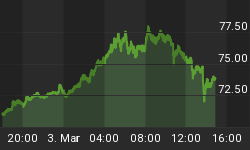"...You don't need Armageddon to hit to make big money in gold. Just a gaggle of central bankers refusing to offer a decent return on your savings..."
FROM THE RUSSIAN INVASION of Afghanistan in 1980 to the terrorist attacks of 9/11, any shock event that sends the stock market lower seems to push gold prices higher.
Black Monday in Oct. '87...the hedge-fund collapse of LTCM nine years later...what's bad for stocks and bonds is good for gold. Right?
That's why gold investors deserve their "ghoulish" tag. We simply can't wait for Armageddon to hit, because we'll get rich...just in time to get fried.
As with so much else, however, detailed research shows this to be untrue. Over the 30-year period ending July 2003, in fact, there was on average no significant correlation between the weekly returns on gold and the weekly returns on stocks.
Not positive or negative. Simply none - or as near as damn it.
"This conclusion is consistent with previous research covering more recent, shorter time periods," says Katharine Pulvermacher, author of this detailed research on behalf of the World Gold Council.
But the idea of gold rising when all other assets tumble isn't entirely wrong, however. Gold really does move in the opposite direction to paper securities. Armageddon notwithstanding, you just need to bide your time.
Between 1994 and 2000, for instance - back when "irrational exuberance" ruled on Wall Street, as Alan Greenspan, then chairman of the US Fed, put it - gold sank 7.6% year-on-year. An equal mix of US equities and bonds, on the other hand, would have given you 10.7% returns each year on average.
Where should your money have been during the '90s? Not in gold, that's for sure!
But this longer-term connexion linking the returns paid by gold and paper securities works the other way, too. And between 1970 and 1980 - the last decade of runaway inflation in the developed world - stocks and bonds lost 1.6% per year on average. Gold's annual gains, meantime, averaged 19.9%.
How come? "Years of low return on risk capital go with years of high returns on gold," as John Dizard of the Financial Times put it. Or put another way, investment money floods into gold when the alternatives fail to offer investors a decent return.
Risk doesn't even come into it, in fact. The real yield offered by US government bonds - the safest debt you can buy according to investment advisors and the rating agencies alike - shows a marked relationship with returns on gold. Higher yields mean lower gold prices. Lower yields invite gold prices to soar.
| Average real yield on 10-year US Treasury (%) | Total change in gold vs. $ (%) | |
| 1970-80 | 0.41 | + 1164 |
| 1980-90 | 5.03 | - 40 |
| 1990-00 | 3.57 | - 31 |
| 2000-07 | 1.83 | + 121 |
Right now, real rates of return on government bonds stand near multi-year lows for investors right across North America and Europe. Are they likely to rise? The bond market certainly doesn't think so.
Thirty-year US bond yields have actually dropped since the Fed began raising its interest rates in June '05. They've fallen by 0.3%. But inflation in the cost of living, at least according to Washington, hasn't changed. So the real rate of return has in fact fallen.
Looking again at that longer-term link between gold prices and Wall Street assets we just saw, you should expect gold to keep rising as real US interest rates remain low.
In the United Kingdom, it's the same story. The Bank of England has hiked base rates 7 times since the summer of 2003. Twenty-year gilt yields, however, haven't budged. Measured against official inflation, in fact, they've dropped by one-half.
Do you trust Ben Bernanke or the Bank of England to raise the real rate of interest anytime soon? If so, then gold isn't the right investment for you.
But if you don't believe central bankers have any plans to reward your cash savings with higher interest rates, then history says gold should definitely figure in your portfolio today.
















